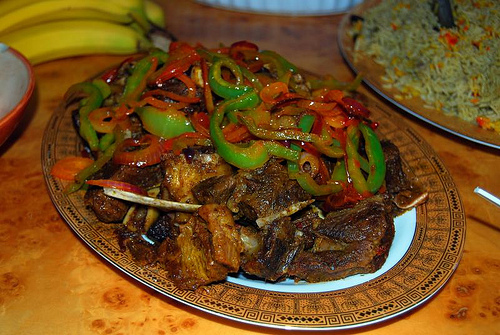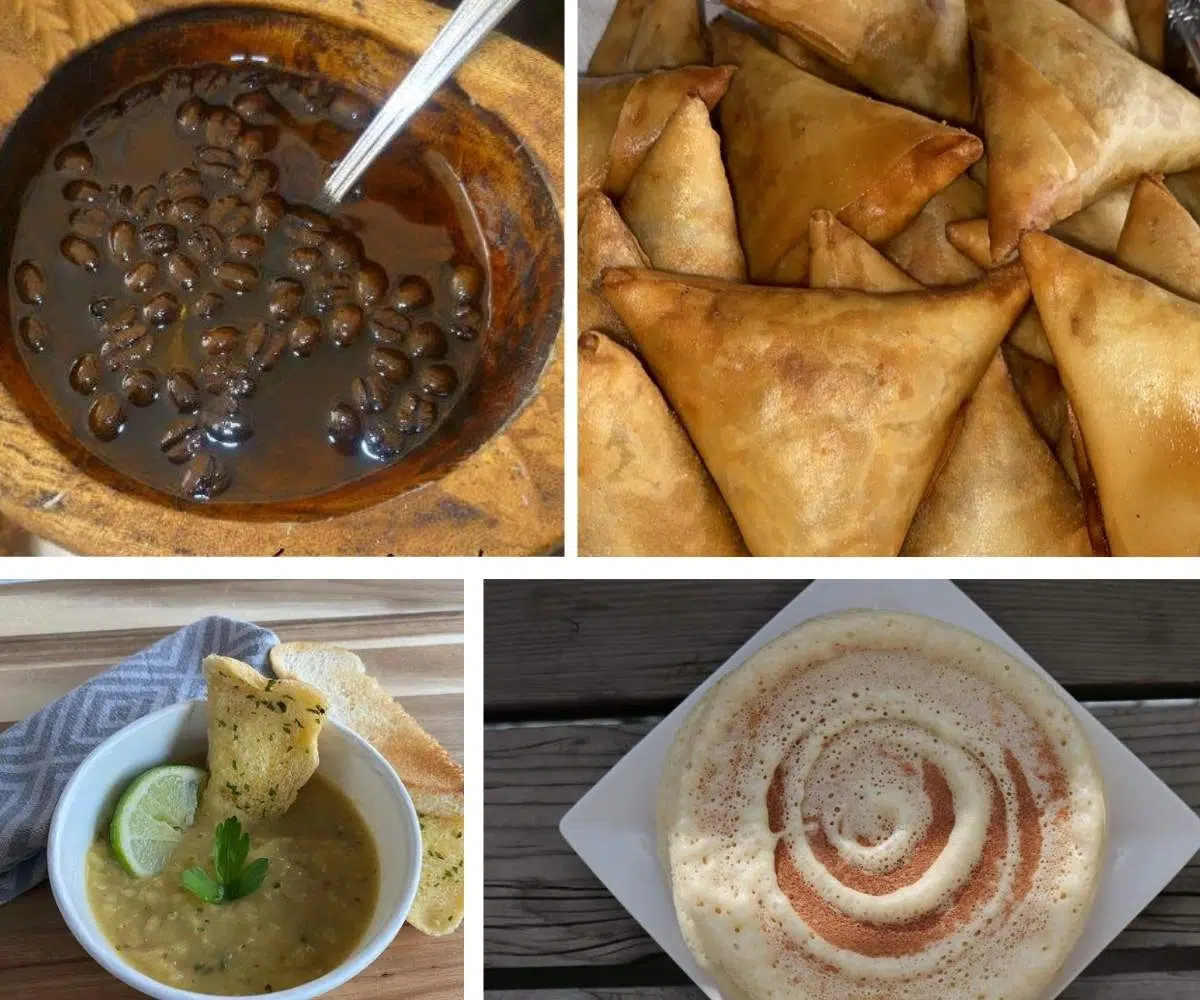Embark on a Flavorful Trip: Somali Food Beyond Borders
Wiki Article
From Staple Dishes to Exotic Specialties: Deciphering the Diverse and Vibrant World of Somali Food

Standard Somali Staples
If you wish to experience genuine Somali cuisine, you must often delight in traditional Somali staples. These staples form the foundation of Somali cooking and showcase the abundant social heritage of the Somali individuals. One such staple is the prominent flatbread called "injera." Made from a fermented batter of teff flour, injera is a vital and functional component of Somali meals. It is often utilized as a tool to scoop up stews and sauces, adding a special texture and taste per bite.Another staple is "baasto," a flavorful pasta dish that is frequently enjoyed in Somali homes. Baasto is typically made with spaghetti or linguine noodles, prepared till tender and after that blended with a great smelling sauce made from tomatoes, onions, garlic, and a mix of typical Somali seasonings (Somali food). This recipe is often served with a side of maraq, a delightfully spiced brew that includes depth and complexity to the meal
Finally, "bariis" or rice is a staple that is deeply embedded in Somali food. Bariis is frequently prepared with great smelling flavors such as cardamom, cinnamon, and cloves, giving it a fascinating fragrance and preference. It is typically offered with a range of meat or vegetable stews, developing a hearty and gratifying dish.
Flavors From the Sea: Somali Seafood Delicacies

One popular seafood special is Isku-dheh karis, a creamy curry made with fish, coconut milk, and a collection of spices. The dish is normally offered with great smelling basmati rice or a flatbread called injera. Another preferred is Muqmad, a dried fish dish that is frequently delighted in as a snack or used as an ingredient in other dishes. The fish is treated with salt and seasonings, providing it a slightly zesty and full-flavored taste.
Lahoh with maraq is a typical Somali pancake served with an abundant fish and shellfish stew. The pancake is squishy and soft, while the stew is made with a mix of shellfishes, fish, and vegetables, simmered in a delicious broth. This meal is a true representation of the seaside flavors located in Somali cuisine.
Whether it's barbequed lobster, spicy shrimp curry, or tangy calamari, Somali fish and shellfish specials are a must-try for any kind of fish and shellfish lover. The quality of the ingredients, incorporated with the fragrant seasonings, produce a harmony of flavors that will transfer your preference buds to the coasts of Somalia. Do not miss out on the chance to appreciate the sea's bountiful prizes when discovering Somali food.
Unique Flavors and Aromatic Herbs
Discover the alluring range of flavors in Somali food with using an excellent range of fragrant herbs and exotic seasonings. Somali food is understood for its dynamic and bold flavors, and these natural herbs and flavors play a vital role in creating the unique taste that sets Somali food apart.One of the most frequently made use of spices in Somali cooking is cumin. Turmeric extract, with its vibrant yellow shade and moderate taste, is another staple in Somali food.
Cardamom, a fragrant flavor with a tip of citrus, click here for more info is also extensively utilized in Somali food preparation. It adds a fragrant and distinct touch to both pleasant and tasty meals. Various other popular spices consist of cinnamon, cloves, and coriander, which are utilized to add warmth and complexity to numerous recipes.
Fragrant natural herbs like mint, parsley, and cilantro are also key components in Somali food. They are made use of to garnish dishes, giving quality and a ruptured of taste. These natural herbs are commonly included in sauces, salads, and meat recipes, enhancing the total preference and fragrance.
With making use of these aromatic herbs and unique seasonings, Somali food uses a tantalizing and truly distinct dining experience. The combination of flavors creates an unified balance that is both memorable and enjoyable. Whether you're taking pleasure in a traditional Somali stew or a delicious rice meal, the spices and natural herbs utilized in Somali cooking make certain to leave a lasting impression on check my reference your taste buds.
Our site
Impacts From Arab, Indian, and European Foods
Arab, Indian, and European cuisines have significantly influenced the diverse and dynamic globe of Somali food. Over the centuries, Somalia's strategic place on the Indian Sea trade courses has actually allowed for an abundant exchange of culinary and social traditions with surrounding Arab and Indian areas, in addition to European colonial powers. These communications have actually left a long lasting influence on the Somali cooking landscape, causing a blend of flavors and strategies that make Somali food absolutely unique.
Among the most substantial impacts can be seen in the considerable usage of seasonings in Somali food preparation. Arab and Indian flavors such as cumin, coriander, cardamom, cinnamon, and cloves are commonly made use of to add deepness and intricacy to Somali meals. The introduction of these flavors has not only enhanced the flavors yet has actually also contributed to the fragrant and vibrant nature of Somali food.
European influences can be mapped back to the colonial age when Somalia was under the control of various European powers, consisting of the Portuguese, British, and Italians. These colonial communications brought new components and cooking techniques to Somalia. For example, pasta recipes like "baasto" (Somali pasta) and "sabayad" (a Somali flatbread) are clear instances of Italian influence.
Celebrating Food in Somali Society
1. Commemorating food is an important component of Somali culture, where common dishes and festive celebrations are cherished practices. Food plays a main role in bringing individuals together, promoting a sense of neighborhood and connection. Whether it's a wedding celebration, a religious holiday, or a basic family event, Somali people take enormous pride in their food and utilize it as a way to celebrate and express their social identification.
In enhancement to the tasty food, the act of sharing a meal is deeply purposeful in Somali culture. It signifies friendliness, generosity, and the significance of area. Somali food. Taking a seat together, often on a floor covering or a communal plate, and eating fosters a sense of unity and reinforces bonds in between household and pals
Furthermore, food is additionally a method to honor and keep in mind loved ones who have actually passed away. During special celebrations, such as the Islamic vacation of Eid al-Fitr, Somalis prepare typical sweets called xalwo as a way of paying homage to their forefathers and keeping their memory to life.
Final Thought
With a range of seafood specials, aromatic natural herbs, and flavors from Arab, Indian, and European cuisines, Somali food is a celebration of tastes and traditions. Whether you're discovering the staple meals or venturing into the globe of unique specialties, Somali food is sure to tantalize your preference buds.If you desire to experience authentic Somali food, you need to often delight in typical Somali staples.To truly submerse yourself in the varied and vivid globe of Somali food, you ought to usually indulge in the beautiful tastes of Somali fish and shellfish specials. Whether you're taking pleasure in a traditional Somali stew or a savory rice dish, the flavors and natural herbs made use of in Somali food preparation are sure to leave an enduring impression on your taste buds.
These interactions have actually left an enduring influence on the Somali culinary landscape, resulting in a fusion of flavors and techniques that make Somali cuisine genuinely special.
Pasta recipes like "baasto" (Somali pasta) and "sabayad" (a Somali flatbread) are clear examples of Italian impact.
Report this wiki page